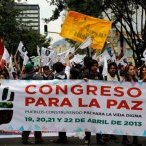
23 de abril de 2013 | Entrevistas | Congreso Nacional para la Paz en Colombia | Anti-neoliberalismo | Derechos humanos | Luchadores sociales en riesgo
Peace Dreams
Progress and Setbacks in Colombia’s Peace Process
Descargar: MP3 (1.9 MB)
The beginning of the Peace Congress in the Colombian capital, Bogota, from April 19 to 22, filled Leon de Grieff’s auditorium at the Universidad Nacional of Colombia, the country’s biggest university. Over 15,000 people met there to talk about the proposals of the organized society for four days.
Since the auditorium was packed, thousands of people had to stay at Che Guevara square, a landmark place of the grassroots and student movement.
While the peace talks between Juan Manuel Santos’s administration and the Revolutionary Armed Forces of Colombia (FARC) continue in Havana, Cuba, social movements and organizations of the country demand participation in a broad negotiation process. The country’s political momentum is historical. “At this time people are aware that they need to participate in this process, that it is not enough that some negotiate the future of the country, or that some sit down to talk about the country’s problems. The organized society, people who have struggled every day for a different country demand to participate in the process”, Marylen Serna told Real World Radio in Bogota.
Serna is a member of the Peoples Congress team. In interview with Real World Radio’s correspondent in Colombia, Danilo Urrea*, Serna said that it is not enough that people go to the streets to approve the peace process. She insisted in the need for the peoples to express what the content is, which are the mechanisms through which peace is achieved through mobilization and what is the ability to coordinate different alternatives to struggle for a peace that will change reality.
The Congress was preceded by the need of social movements and organizations to come up with popular legislation. The aim is to promote bills approved by the peoples to confront deprivation laws and the militarization offered by the past governments.
One of the concerns of the Congress is what will be the result of these four days of meetings and where will the demands agreed by the lawmakers lead them. Serna said that “there are some key issues that we have already analysed. But today we are saying it is already time to build alternatives. For example, what is the proposal in terms of land policies, in terms of the presence of transnational corporations. This will provide more specific content to the social agenda. But besides having an agenda it is necessary to come up with new mechanisms to overcome social dispersion. There are still many isolated processes happening. This Congress has the challenge of guiding those scenarios of coordination and to gather around peace”.
The leader said the scenario for the talks in Havana is interesting but it is not the place where this Congress would take its outcomes and demands, because we would have to deliver a document to the government or the insurgents with proposals for them to discuss. “We believe that we need to think about the scenarios where these problems are discussed, especially so that the government has political will to make the necessary changes, which will not be as simple, but it will be possible through strong mobilization”, said Serna.
When asked about whether there are objective conditions for peace in Colombia, the activist said “when the government marches for peace, behind the seeming will are the laws of deprivation, the denial of the peoples’ rights, the creation of laws that ignore the rights to organize and demonstrate”. “While we make progress to stop the armed conflict, we are also going backwards in terms of justice, of peoples’ rights. Under these circumstances it will be very hard to have peace in Colombia”, she concluded.
* Danilo Urrea is a member of CENSAT Agua Viva – Friends of the Earth Colombia.
Photo: patiobonitoaldia.com








